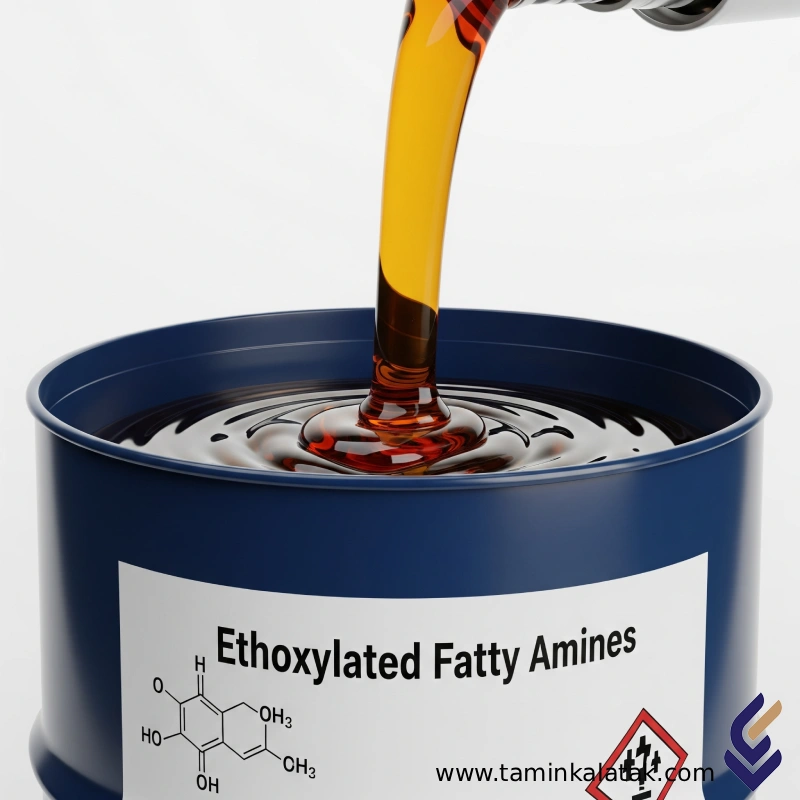Ethoxylated fatty amines
Ethoxylated Fatty Amines are nonionic surfactants produced by the controlled reaction of long-chain fatty amines (C₁₂–C₂₂) with ethylene oxide (EO).
The resulting molecules contain a hydrophilic ethoxy chain and a hydrophobic alkyl chain, providing excellent wetting, emulsifying, and antistatic properties.
General Chemical Structure
R–NH–(CH₂CH₂O)ₙ–H
-
R: Saturated or unsaturated alkyl chain, typically derived from coconut oil, tallow, soybean, or rapeseed oil
-
n: Number of ethylene oxide units (commonly 2–20, and up to 50 in specialized grades)
Physical and Chemical Properties
| Property | Typical Value / Description |
|---|---|
| Appearance | Clear liquid to pale yellow wax (depending on alkyl chain length and EO content) |
| Viscosity (25°C) | Low to high (increases with higher EO content) |
| Density (20–25°C) | 0.95 – 1.00 g/cm³ |
| Solubility in Water | Varies with EO content — higher n = better solubility |
| pH (1% Solution) | 7.0 – 9.5 |
| Foaming Ability | Moderate |
| Surfactant Type | Nonionic |
Applications
Agriculture
-
Emulsifier in pesticide and liquid fertilizer formulations
-
Penetration enhancer (wetting agent) in foliar spray applications
Oil, Gas, and Drilling
-
Additive for drilling fluids and well-cleaning formulations
-
Foam stabilizer and contact angle modifier
Industrial Cleaning
-
Component of metal cleaners, automotive detergents, and hard surface cleaners
-
Antistatic additive in textile and fabric detergents
Textile, Leather, Paint, and Plastics
-
Antistatic, lubricant, and wetting agent
-
Dispersing agent for pigments and dyes
Advantages
-
Excellent wetting and emulsifying power
-
Stable over a wide pH range (3–11) and in hard water
-
Compatible with anionic, cationic, and amphoteric surfactants
-
Nonionic character → does not interfere with ionic or sensitive compounds
-
Biodegradable in suitable grades (OECD 301 compliant)
Limitations
-
Some grades may cause skin irritation with prolonged contact
-
Unstable in the presence of strong oxidizing agents
-
Hygroscopic at high EO content (absorbs moisture)
-
Higher cost compared to simple anionic surfactants
Safety and Handling
-
Skin/Eye Contact: May cause irritation — wear protective gloves and goggles
-
Inhalation: No significant hazard under proper ventilation
-
Flash Point: Above 150°C
-
Chemical Compatibility: Incompatible with strong oxidizing agents
-
Storage Conditions: Store in polymeric or HDPE containers, in a cool, dry, and well-ventilated area, away from direct sunlight
-
Environmental Stability: Biodegradable and low environmental risk at recommended concentrations
Summary
Ethoxylated Fatty Amines are versatile nonionic surfactants offering excellent wetting, emulsifying, and antistatic performance across a wide range of industrial and agricultural formulations.
Their broad compatibility, chemical stability, and biodegradability make them ideal for use in cleaning agents, emulsifiers, drilling fluids, textile aids, and crop protection formulations.
Applications
| Applications | , , , , |
|---|
Ethoxylated fatty amines
| Products | Chemical formula | CAS number | Grade | Physical appearance | Vapor pressure | Solubility in water | Melting point | Density (at 20°C) |
|---|---|---|---|---|---|---|---|---|
| Ethoxylated fatty amines | CₓHᵧN(OCH₂CH₂)ₙ (depends on the length of the R chain and the number of EOs; example for C₁₆ with 5 EOs: C₂₂H₄₉NO₅) | 61791-14-8 (for C₁₂–C₁₈ ethoxylated fatty amines) — other chains have different CAS | Industrial grade / Technical grade / Agricultural grade | Clear liquid to pale yellow wax (depending on chain and EO amount) | Very low, < 0.01 mmHg at 25°C | Soluble or semi-soluble (solubility increases as n increases) | Typically < 0°C to about 40°C (depending on type and n) | 0.95 – 1.00 g/cm³ |







